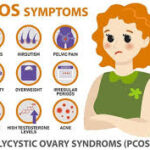Women’s Health: A Complete Guide to PCOS, Menstrual Health, Fertility, Menopause, and Pregnancy Wellness
A Holistic Guide to Women’s Health: From Hormones to Pregnancy
Women’s health encompasses more than just reproductive care—it involves understanding hormonal balance, physical wellness, emotional resilience, and preventive strategies at every stage of life. From managing PCOS to navigating pregnancy, the menstrual cycle, menopause, and fertility, women benefit greatly from informed, proactive self-care.
This guide explores five key areas of women’s health, offering science-based strategies, nutrition tips, and wellness advice for empowered living: PCOS management, menstrual health, ovulation and fertility, menopause support, and pregnancy wellness.
1. PCOS Management and Nutrition
Polycystic Ovary Syndrome (PCOS) is a common hormonal condition that affects roughly 1 in 10 women of reproductive age. Symptoms can include irregular periods, acne, weight gain, excessive hair growth, and fertility challenges.
Smart Nutrition for PCOS
While there is no cure for PCOS, the condition is highly manageable with the right diet and lifestyle:
- Low Glycemic Index (GI) Foods: Whole grains, legumes, and non-starchy vegetables help regulate blood sugar.
- High-Fibre Intake: Leafy greens, chia seeds, and oats improve insulin sensitivity and reduce inflammation.
- Lean Proteins: Tofu, fish, poultry, and legumes stabilize blood sugar and control appetite.
- Healthy Fats: Omega-3s found in flaxseeds, salmon, and walnuts help lower androgen levels.
Lifestyle Support for PCOS
- Engage in moderate exercise 4–5 times a week
- Avoid processed foods and added sugars
- Practice stress-reducing habits like yoga or mindfulness
- Consider supplements such as inositol, zinc, and vitamin D—only under medical guidance
2. Menstrual Cycle Awareness and Hormone Health
Understanding your menstrual cycle helps you track ovulation, recognize hormonal imbalances, and identify potential reproductive health issues.
The Four Phases of the Menstrual Cycle
- Menstrual Phase (Days 1–5): Shedding of the uterine lining
- Follicular Phase (Days 1–13): Hormones trigger the development of an egg
- Ovulation (Day 14): The mature egg is released
- Luteal Phase (Days 15–28): The body prepares for pregnancy or another cycle
Tips for a Healthier Cycle
- Follow an anti-inflammatory diet with berries, healthy fats, and leafy greens
- Track cycle patterns and symptoms using apps or journals
- Stay hydrated and get 7–8 hours of sleep
- Use herbal teas like ginger or raspberry leaf for natural cramp relief
- Seek medical advice if your periods are excessively painful, heavy, or irregular
3. Fertility Support and Ovulation Tracking
Fertility is influenced by hormones, lifestyle, diet, and age. Understanding your ovulation window is key to increasing your chances of conception.
Ovulation Signs to Watch For
- Clear, stretchy cervical mucus
- Slight rise in basal body temperature
- Ovulation pain or light cramping
- Boost in libido and energy
Boosting Fertility Naturally
- Use ovulation predictor kits (OPKs) or cycle-tracking apps
- Maintain a healthy body weight
- Limit caffeine and alcohol
- Prioritize nutrient-dense foods rich in iron, zinc, and folate
- Reduce stress with meditation, journaling, or therapy
- Consult a fertility specialist if you’ve tried to conceive for 12 months (or 6 months if over 35)
4. Navigating Menopause and Perimenopause
Menopause marks the end of reproductive function and typically occurs between ages 45 and 55. It is diagnosed after 12 months without a menstrual period. Perimenopause, the lead-up phase, brings hormonal fluctuations that trigger a variety of symptoms.
Common Menopause Symptoms
- Hot flashes and night sweats
- Mood swings and irritability
- Sleep disturbances
- Vaginal dryness
- Weight gain, especially around the midsection
Natural Ways to Ease the Transition
- Phytoestrogens: Found in soy, flaxseeds, and lentils—may help balance hormones
- Regular Exercise: Improves mood, bone health, and sleep
- Calcium and Vitamin D: Prevent bone loss; found in leafy greens and fortified foods
- Cooling Strategies: Dress in layers, avoid spicy foods, stay hydrated
- Herbal Remedies: Black cohosh and evening primrose oil (use under supervision)
Menopause is not a disease—it’s a natural phase. With supportive care and lifestyle adjustments, many women navigate this time with strength and ease.
5. Pregnancy Nutrition and Safe Fitness
Pregnancy brings major changes to the body and requires elevated attention to nutrition, hydration, and movement. A well-balanced diet and regular exercise help ensure both mother and baby stay healthy.
Essential Nutrients for Pregnancy
- Folic Acid: 400–800 mcg daily to prevent neural tube defects
- Iron: Vital for blood production; found in lentils, leafy greens, and lean meat
- Calcium: Supports fetal bone development; sources include dairy, spinach, and fortified juices
- Protein: Needed for cell growth; aim for 75–100 grams daily
- Omega-3 Fatty Acids: Crucial for brain development; found in chia seeds, walnuts, and salmon
Safe Exercise Options
- Walking: Great for circulation and energy
- Prenatal Yoga: Eases tension and prepares the body for labor
- Swimming: Relieves pressure on joints and reduces swelling
- Light Strength Training: Supports muscle tone when done with proper technique
Avoid high-risk sports and always consult a healthcare provider before starting or continuing an exercise routine during pregnancy.
Conclusion: Embracing Women’s Health at Every Stage
Women’s health evolves through each life stage—from hormonal shifts in the teenage years to fertility planning, pregnancy, and the menopausal transition. Knowledge is a powerful tool that enables women to make informed decisions and care for their bodies with confidence.
By managing conditions like PCOS, tracking your cycle, supporting fertility, preparing for menopause, and nurturing a healthy pregnancy, you create a strong foundation for lifelong well-being.
Prioritize nutrition, stay active, manage stress, and don’t hesitate to seek professional advice. True wellness begins with awareness and small, consistent steps toward self-care.
